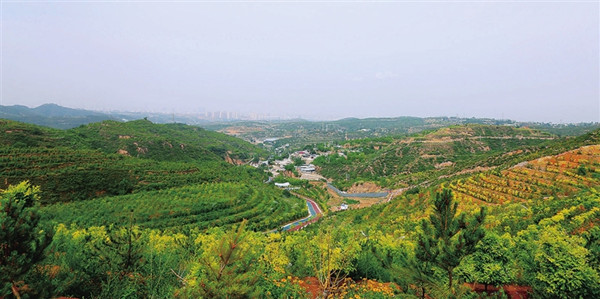
A glorious view of Wangjia Mountain Forest Park in Taiyuan. [Photo/Taiyuan Daily]
Taiyuan, capital of North China's Shanxi province, is surrounded by mountains on three sides and the ecological conservation, management and restoration of the mountains are widely perceived to directly impact the overall living environment of the locals.
The Wangjia Mountain Forest Sports Park in Wangjiashan village, administered by Xinghualing district, is one of the 30 suburban forest parks in Taiyuan and in previous times was a landfill for loess, deposit of wind-blown silt that covers large parts of the region.
Wen Qi, director of land and greening management section of Taiyuan municipal planning and natural resources bureau, said that after nearly eight years of filling the deep gully with loess, in early 2020, Xinghualing district decided to implement comprehensive ecological management of the landfill site and turn it into a forest and sports park.
According to the blueprint, the total planned area of the forest park with seven sightseeing platforms will be 249 hectares.
At present, more than 300,000 trees of various types have been planted and infrastructure such as power grids, water networks and road networks have been installed. Basketball courts, football fields, tennis courts and voluntary tree planting-themed halls, ecological civilization promotion galleries and giant high-definition LED publicity screens are being built in the forest sports park to realize the integration of the ecology, landscaping and people's life.
The increasingly beautiful environment has seen more people visit nearby Wangjiashan village and this has benefited villagers. Quite a few of them have opened farmhouses and homestays and offered agricultural picking services to boost rural tourism, which has also increased their incomes.
Once suffering from a fragile ecosystem and poor river water quality caused by long-term overmining, Muyun Mountain in Baiban township, administered by Jiancaoping district, has also undergone great changes to its ecology and environment.
Since the Muyun Mountain abandoned mining site treatment project was implemented in 2020, the local green area has increased by 990,000 square meters, the ecosystem of the Fenhe River Basin has been improved and the living environment in the mountain area has been enhanced, said Lei Ming, director of ecological restoration section of Taiyuan municipal planning and natural resources bureau.
Apart from the treatment project in Muyun Mountain, Taiyuan has implemented 39 pilot projects for the conservation and restoration of landscapes, forests, farmlands, lakes and grasslands in the middle and upper reaches of the Fenhe River in Loufan county, Gujiao county-level city, Wanbailin and Jiancaoping districts.
This year, Taiyuan's forestry investment has also reached a record of 1.58 billion yuan ($244.54 million), focusing on the Fenhe River basin and the eastern, western and northern mountains surrounding the city.
